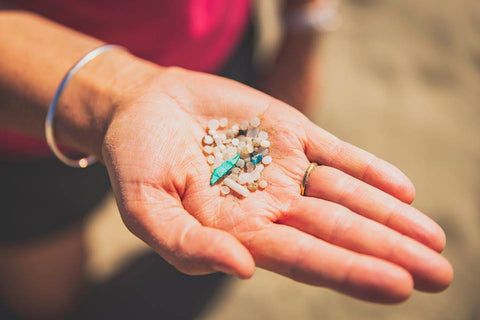I don’t litter so how does plastic get into the ocean?
Posted by Helen Townsend on
We keep hearing that 8 million tonnes of plastic waste ends up in the ocean every year, but how exactly does it get there? If I’m a tidy Kiwi who doesn’t litter, where is the mounting plastic debris coming from and is there anything I can do about it?
Plastic is lightweight and cheap, making it dangerously impactful on the environment. Think of a plastic bag and how much it resembles a parachute when it gets caught in the wind. Even if we don’t purposefully litter, we often unintentionally cause plastic to end up in the ocean. Here are some of the ways it happens and what we can do about it.

At the beach
At Cape Arnham in the Northern Territory in Australia footwear and jandals were found to be the most common item littering the beach. Jandals are inexpensive and when we think of them as disposable we neglect to look after them, often leaving them below the high tide line to be swept out to sea by the waves.
If every New Zealander loses a pair of sunglasses or jandals every year, there’s over 5 million plastic items straight into the sea.
Solution: Value your jandals as you would if they were expensive. Don’t leave any debris at the beach, including shoes, tents, plastic cutlery or cups.
Poor waste management systems
The majority of the countries that contribute to marine plastic litter are middle-income countries, where the economy is growing faster than the waste management infrastructure. However, New Zealand’s waste management systems aren’t perfect. Next rubbish day look at your street after the collection – there are always bits of plastic that have escaped as the wheelie bin is tipped into the truck.
Added to this, landfills aren’t sealed while they’re in use, so any loose plastic that is dumped can easily blow away. This plastic eventually ends up in the ocean.
Solution: Use a paper bin liner to make sure your rubbish is contained before putting it in the wheelie bin. Reduce your plastic consumption as much as possible to limit your rubbish.
Fishing gear
The largest contributor of plastic waste to the Great Pacific Garbage Patch comes from fishing equipment, amounting to a whopping 46% (by weight). These “ghostnets” keep drifting through the oceans entangling whales, dolphins and turtles. Whether or not you’re a commercial fisher, if you choose to eat net-caught fish you are supporting this practice.
Solution: Eat fish from the sustainable fish guide http://bestfishguide.org.nz/about/ to ensure you’re supporting safe fishing practices that do not harm ocean life. Look after your fishing gear, take it home and dispose of it correctly.
Microfibres
Every time we wash a fleece jacket it can release thousands of plastic fibres that are too small to be filtered out at sewage treatment plants. Studies indicate that synthetic fibres in our clothes could be poisoning our waterways and, by extension, the food we eat.
Solution: Wear natural fibres. Spot wash fleece and only machine wash them when absolutely necessary. Use face cloths and cleaning cloths made from natural fibres.

Manufacturing
Evans Bay in Wellington is covered with plastic ‘nurdles’ – the raw plastic beads or pellets used to make the products that we like to buy. These nurdles have escaped from the local manufacturers before they’ve even been made into anything useful, and have been described by environmentalists as “an oil spill, just a different form”.
The more plastic goods we consume, the more plastic is manufactured and the more nurdles are likely to escape into the ocean.
Solution: If we buy fewer plastic items, fewer nurdles will be created and land in our waterways. We’ll save money too, and space – you won’t have to Maree Kondoo your house!
Cigarette butts
Dropping cigarette butts is littering, and they go straight down the drains to the ocean. Cigarette butts are the most common item found on beach cleanups around the world, they’re made of plastic and do not biodegrade.
Solution: If you smoke, dispose of the butt in a responsible way. When you’re out use a pocket ashtray to keep the butt safe until you can dispose of it.
Littering
Ok, so we don’t litter but sometimes we accidentally drop a bottle lid, or ice-cream wrapper while we’re juggling the kids, the shopping and the car keys. If we all accidentally drop one piece of plastic every year, that’s five million pieces of plastic waste.
Solution: Accidents happen, so when you’re at the beach help others by picking up any rubbish you see. Download the app Litterati to make picking up rubbish into a treasure hunt – and join our Litterati club, named “The Rubbish Whisperer”, to add your total to ours!




Visa
[url=http://www.guf2424x3rlbg06h198a2q30is8wy9b2s.org/]umlpngcfrie[/url]
mlpngcfrie http://www.guf2424x3rlbg06h198a2q30is8wy9b2s.org/
amlpngcfrie
Visa
cmrenpmht http://www.g4y1vv5596hgxec4q813j99438vafrp5s.org/
acmrenpmht
[url=http://www.g4y1vv5596hgxec4q813j99438vafrp5s.org/]ucmrenpmht[/url]
Visa
zsmxmnek http://www.g3z50sb9r6nw013equbkn5626c546qy5s.org/
azsmxmnek
[url=http://www.g3z50sb9r6nw013equbkn5626c546qy5s.org/]uzsmxmnek[/url]
Visa
[url=http://www.g1t79b6q16l7o6nsq5j2a765ayk59t7ks.org/]uvxpgqwdif[/url]
avxpgqwdif
vxpgqwdif http://www.g1t79b6q16l7o6nsq5j2a765ayk59t7ks.org/
Cigarette butts drive me mad! I run a waste management business in England, www.towaskip.co.uk and I’m forever telling people it is litter!